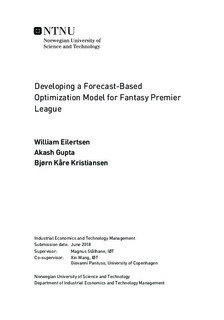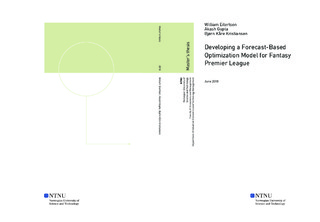| dc.description.abstract | Fantasy Premier League is an online game where participants assemble imaginary teams consisting of real-life football players competing in the top tier of English football, the Premier League. Participants gain points week-by-week based on the real-life performances of the players they have selected. In this thesis, a mathematical model describing Fantasy Premier League is developed. Moreover, a forecast-based optimization model is developed to make decisions in Fantasy Premier League.
The mathematical model has been solved by using a rolling horizon heuristic with forecasts of player points as input. Three forecasting methods are developed in order to generate forecasts. The first approach is centered around the most recent average points obtained by each individual player. The second approach is based on regression on multiple explanatory variables. The third and last approach utilizes bookmakers odds to predict points, combining team odds and individual player odds. In order to obtain data for the last approach, we have cooperated with Sportradar, a Norwegian company providing odds for international bookmakers. The mathematical model developed is also solved with realized points to obtain the optimal solution.
An additional feature of Fantasy Premier League is a concept called gamechips. Gamechips can be used to improve the performances in particular gameweeks. These gamechips are modeled in the mathematical model. Strategies for the implementation of gamechips are developed and their impact is tested. Furthermore, the effect of adding risk handling constraints has been analyzed. It is tested whether there exists a trade-off between risk and reward, similar to that found in portfolio optimization.
The model has been run for the first 35 gameweeks of the 2017/2018 Fantasy Premier League season, and the results are compared to the performance of Fantasy Premier League participants. The last part of the thesis is dedicated to a discussion of further research pos- sibilities. | |

